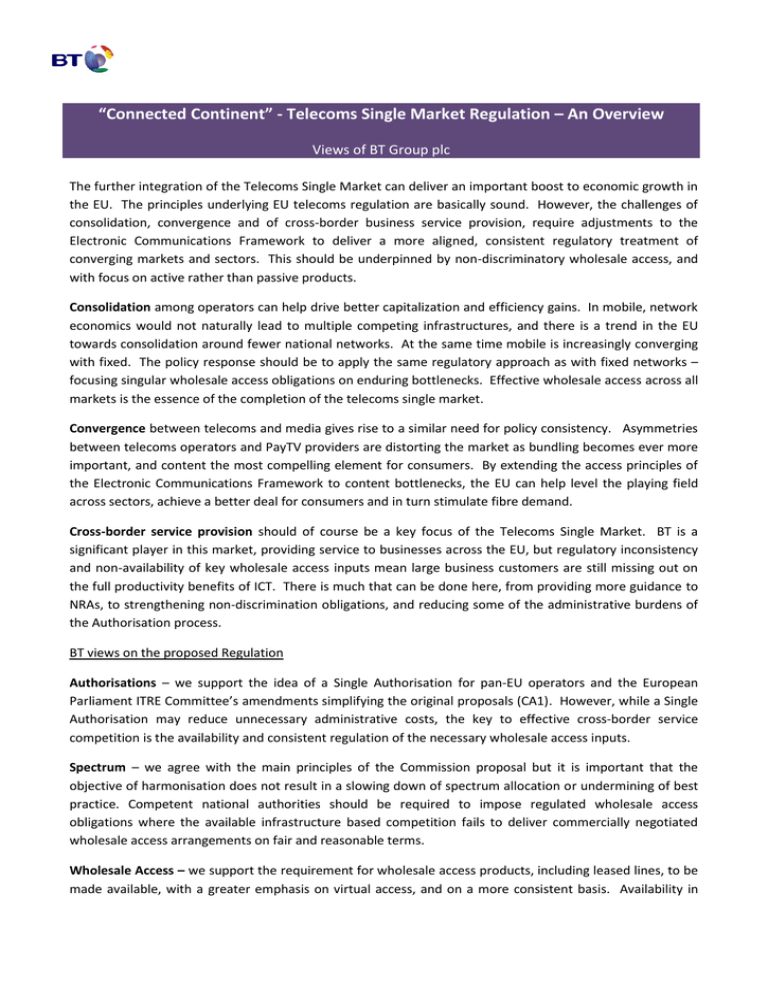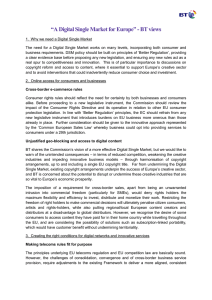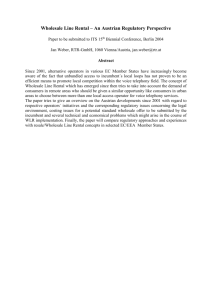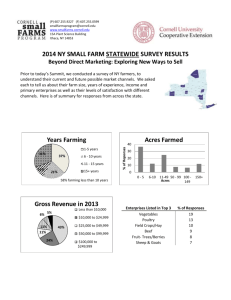“Connected Continent” - Telecoms Single Market Regulation – An Overview
advertisement

“Connected Continent” - Telecoms Single Market Regulation – An Overview Views of BT Group plc The further integration of the Telecoms Single Market can deliver an important boost to economic growth in the EU. The principles underlying EU telecoms regulation are basically sound. However, the challenges of consolidation, convergence and of cross-border business service provision, require adjustments to the Electronic Communications Framework to deliver a more aligned, consistent regulatory treatment of converging markets and sectors. This should be underpinned by non-discriminatory wholesale access, and with focus on active rather than passive products. Consolidation among operators can help drive better capitalization and efficiency gains. In mobile, network economics would not naturally lead to multiple competing infrastructures, and there is a trend in the EU towards consolidation around fewer national networks. At the same time mobile is increasingly converging with fixed. The policy response should be to apply the same regulatory approach as with fixed networks – focusing singular wholesale access obligations on enduring bottlenecks. Effective wholesale access across all markets is the essence of the completion of the telecoms single market. Convergence between telecoms and media gives rise to a similar need for policy consistency. Asymmetries between telecoms operators and PayTV providers are distorting the market as bundling becomes ever more important, and content the most compelling element for consumers. By extending the access principles of the Electronic Communications Framework to content bottlenecks, the EU can help level the playing field across sectors, achieve a better deal for consumers and in turn stimulate fibre demand. Cross-border service provision should of course be a key focus of the Telecoms Single Market. BT is a significant player in this market, providing service to businesses across the EU, but regulatory inconsistency and non-availability of key wholesale access inputs mean large business customers are still missing out on the full productivity benefits of ICT. There is much that can be done here, from providing more guidance to NRAs, to strengthening non-discrimination obligations, and reducing some of the administrative burdens of the Authorisation process. BT views on the proposed Regulation Authorisations – we support the idea of a Single Authorisation for pan-EU operators and the European Parliament ITRE Committee’s amendments simplifying the original proposals (CA1). However, while a Single Authorisation may reduce unnecessary administrative costs, the key to effective cross-border service competition is the availability and consistent regulation of the necessary wholesale access inputs. Spectrum – we agree with the main principles of the Commission proposal but it is important that the objective of harmonisation does not result in a slowing down of spectrum allocation or undermining of best practice. Competent national authorities should be required to impose regulated wholesale access obligations where the available infrastructure based competition fails to deliver commercially negotiated wholesale access arrangements on fair and reasonable terms. Wholesale Access – we support the requirement for wholesale access products, including leased lines, to be made available, with a greater emphasis on virtual access, and on a more consistent basis. Availability in particular of wholesale Ethernet access (leased line) products is the absolute key to the enabling of crossborder business service provision and therefore to the creation of the genuine Telecoms Single Market. The further development of harmonised standards may facilitate this but will need to be carefully assessed against potential cost implications for existing products. We support the amendments adopted in the European Parliament Plenary vote in relation to “wholesale high-quality access products allowing the provision of business communications services”, though we believe the provisions on reference offers must be strengthened to make this more effective. The extension of the ‘Article 7’ veto may assist more effective enforcement. The veto over SMP remedies should be clarified as relating to SMP obligations for new access products in a ‘home’ country, which would be consumed by a “European electronic communications provider” from a different country. Assured Service Quality Connectivity - BT supports the commercial freedom to provide such services but the nature of reciprocity for granting access to such services requires clarifying and strengthening. Net Neutrality – we agree with the principles of an open internet proposed by the Commission, preventing anti-competitive blocking and providing transparency, but allowing reasonable traffic management and allowing innovation. We do not support the amendments adopted in the European Parliament Plenary vote, which are overly restrictive and which raise legal uncertainty. The amendments previously voted in the European Parliament ITRE and IMCO Committees offered a more pragmatic solution. We believe that national authorities should in any case have greater flexibility to maintain self-regulatory mechanisms where these already meet the policy objectives and to avoid overly prescriptive detail. Bundling – we support the consistent approach to bundles, an area where the market has changed fundamentally since the current Directives were agreed and which will ensure a better deal for consumers. Consumer Protection – we support high levels of consumer protection but question how consumers will benefit from the sweeping harmonisation of requirements which are mainly already enshrined in EU legislation. Where new requirements are introduced (eg on contract termination, control of consumption) there is a risk of extra costs without commensurate consumer benefit. We welcome the vote in the European Parliament Plenary in favour of a Directive as the appropriate legal instrument. Roaming – we welcome the intention to further reduce excessive international roaming charges, which will clearly benefit consumers. There is a risk however that the proposals, including the proposed “roaming alliances” may harm the potential competitive position of MVNOs. We welcome the vote in the European Parliament but wish to see the direct introduction of lower wholesale price cap steps to allow all market players to offer competitive price offers. 7 April 2014 BT Group plc BT is one of the world’s leading communications services companies, serving the needs of customers in the UK and in more than 170 countries worldwide.




